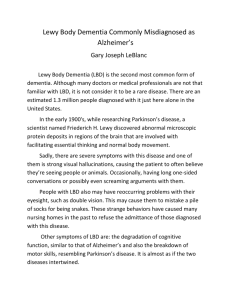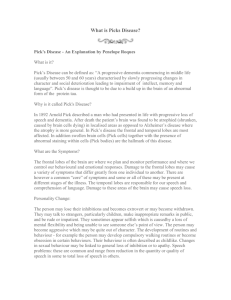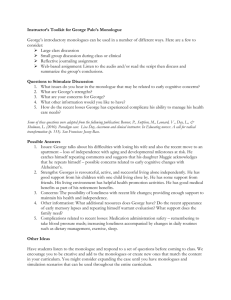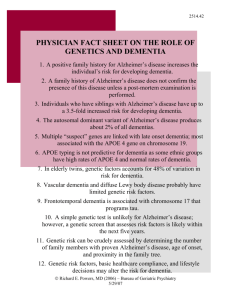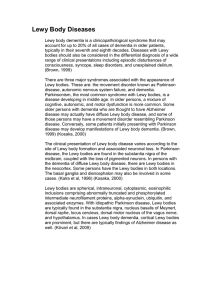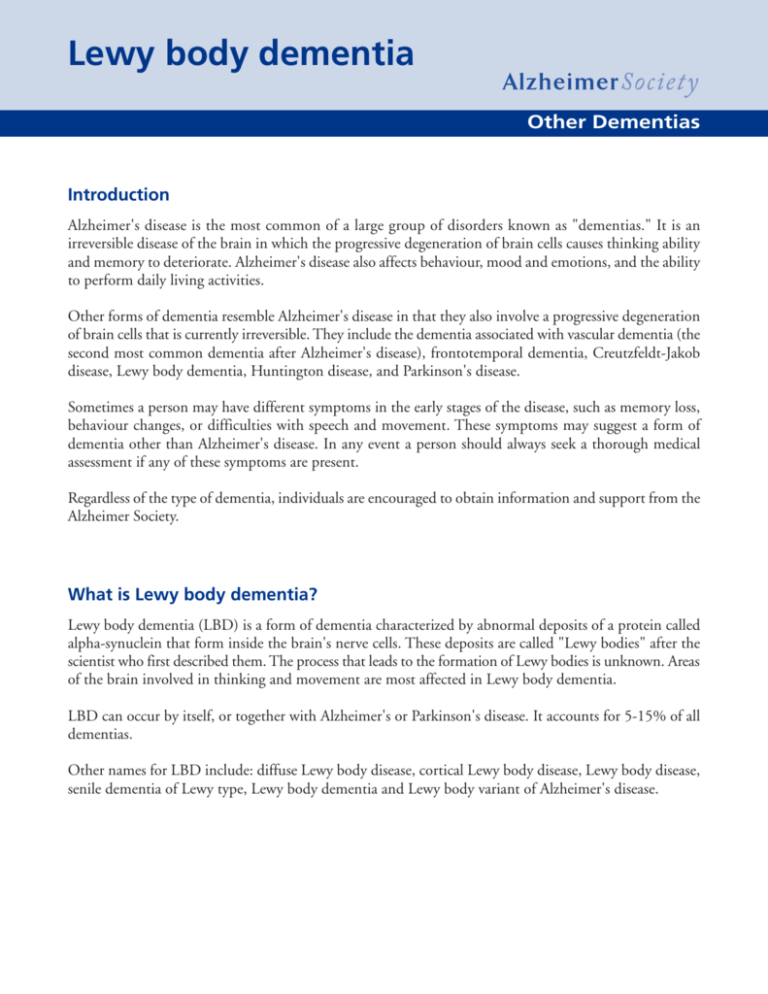
Lewy body dementia
Other Dementias
Introduction
Alzheimer's disease is the most common of a large group of disorders known as "dementias." It is an
irreversible disease of the brain in which the progressive degeneration of brain cells causes thinking ability
and memory to deteriorate. Alzheimer's disease also affects behaviour, mood and emotions, and the ability
to perform daily living activities.
Other forms of dementia resemble Alzheimer's disease in that they also involve a progressive degeneration
of brain cells that is currently irreversible. They include the dementia associated with vascular dementia (the
second most common dementia after Alzheimer's disease), frontotemporal dementia, Creutzfeldt-Jakob
disease, Lewy body dementia, Huntington disease, and Parkinson's disease.
Sometimes a person may have different symptoms in the early stages of the disease, such as memory loss,
behaviour changes, or difficulties with speech and movement. These symptoms may suggest a form of
dementia other than Alzheimer's disease. In any event a person should always seek a thorough medical
assessment if any of these symptoms are present.
Regardless of the type of dementia, individuals are encouraged to obtain information and support from the
Alzheimer Society.
What is Lewy body dementia?
Lewy body dementia (LBD) is a form of dementia characterized by abnormal deposits of a protein called
alpha-synuclein that form inside the brain's nerve cells. These deposits are called "Lewy bodies" after the
scientist who first described them. The process that leads to the formation of Lewy bodies is unknown. Areas
of the brain involved in thinking and movement are most affected in Lewy body dementia.
LBD can occur by itself, or together with Alzheimer's or Parkinson's disease. It accounts for 5-15% of all
dementias.
Other names for LBD include: diffuse Lewy body disease, cortical Lewy body disease, Lewy body disease,
senile dementia of Lewy type, Lewy body dementia and Lewy body variant of Alzheimer's disease.
How does Lewy body dementia affect the person?
In LBD, a person may experience symptoms similar to those of both Parkinson's and Alzheimer's disease.
A progressive loss of memory, language, reasoning and other higher mental functions such as calculation
is common. The person may have difficulty with short-term memory, finding the right word and sustaining
a train of thought. An individual may also experience depression and anxiety. Visual spatial disorientation
can also be a common manifestation of this disease. Marked fluctuations in alertness may be experienced.
Lewy body dementia may have a rapid progression. Memory difficulties may not be an early symptom, but
can develop as LBD progresses. Visual hallucinations (seeing things which are not real) are common and
can be worse during times of increased confusion. The visual hallucinations are often recurrent and typically
consist of people, children or animals. People with the disease may also have psychotic and fixed false
beliefs or make errors in perception, for example, seeing faces in a carpet pattern.
Some features of LBD can resemble Parkinson's disease. These include rigidity (stiffness of muscles), tremors
(shaking), stooped posture and slow, shuffling movements. Sensitivity to medication, especially some
sedatives, may exaggerate these symptoms. At present, it is believed that at least a number of people
diagnosed with Parkinson’s disease could well have LBD in addition to Parkinson’s disease.
How is Lewy body dementia assessed?
No single test can diagnose LBD. Doctors diagnose the disease through a process of eliminating other
diseases and conditions that can cause similar symptoms. Assessment may include a neurological exam
that emphasizes gait, posture and the degree of rigidity. Medical history, brain imaging (such as with an
MRI), physical and neuropsychological testing can also be helpful in making a diagnosis of LBD.
What are the risk factors for Lewy body dementia?
At present, there is no known cause of LBD and risk factors have not been identified. However, Lewy
bodies contain a protein associated with Parkinson's disease and are often found in the brain of people
with Parkinson's or Alzheimer's disease, suggesting that the three conditions may be linked in some way.
If a family member has LBD, there may be an increased risk of developing the disease. LBD is more
common in men than in women.
2 © September 2011, Alzheimer Society of Canada. All rights reserved.
Other Dementias - Lewy body dementia
Is there treatment?
At present, there is no cure for LBD. It is sometimes possible to use medications to treat symptoms such
as those associated with Parkinson's disease, depression, and unpleasant hallucinations. Cholinesterase
inhibitors are medications used in treating Alzheimer's disease. They can improve alertness and cognition
in some people and may reduce hallucinations and other distressing symptoms. However, due to the
multiple features of LBD and Parkinson's disease symptoms, treatment of one symptom may be achieved
by worsening another. One strategy to avoid or prevent this is to treat symptoms in order of their severity.
New behavioural therapeutic strategies are also helping people living with the disease. Therapeutic
techniques like physical activity and music are being used as viable and useful treatments. Research shows
that the quality of life of people with dementia, and also their caregivers, is significantly improved by
activities that emphasize their strengths and abilities. By understanding the person’s personality, life
experiences, support systems and ways of coping, a person-centred approach to care can be created that
preserves and improves quality of life.
For more information:
Visit the Alzheimer Society's website at www.alzheimer.ca or contact your local Alzheimer Society.
More information can be obtained from the following:
•
•
Lewy Body Dementia Association Inc.: www.lewybodydementia.org.
Mayo Clinic: http://www.mayoclinic.com/health/lewy-body-dementia/DS00795
The contents of this document are provided for information purposes only, and do not represent advice, an
endorsement or a recommendation, with respect to any product, service or enterprise, and/or the claims and
properties thereof, by the Alzheimer Society of Canada. This Information Sheet is not intended to replace clinical
diagnosis by a health professional.
Other Dementias - Lewy body dementia
© September 2011, Alzheimer Society of Canada. All rights reserved.
3
Alzheimer Society of Canada
20 Eglinton Avenue West, 16th Floor, Toronto, Ontario, M4R 1K8
Tel: 416-488-8772 • 1-800-616-8816 • Fax: 416-322-6656
E-mail: info@alzheimer.ca • Website: www.alzheimer.ca
Facebook : www.facebook.com/AlzheimerSociety • Twitter : www.twitter.com/AlzSociety
R300-06E 2015

